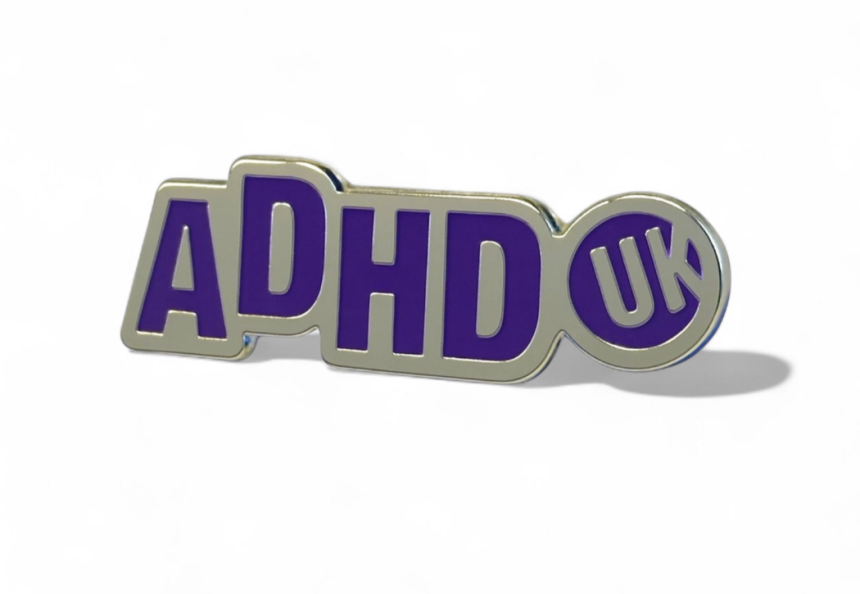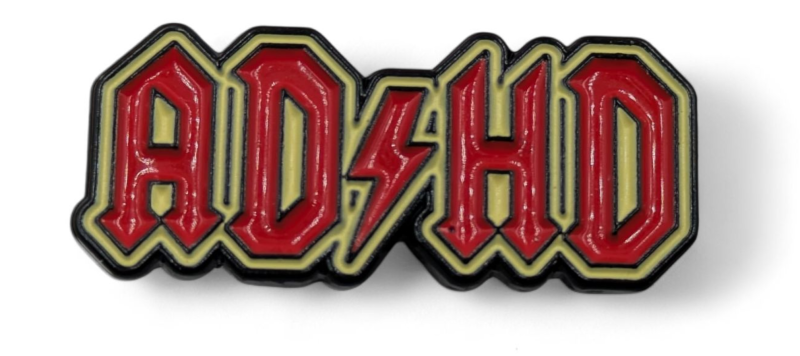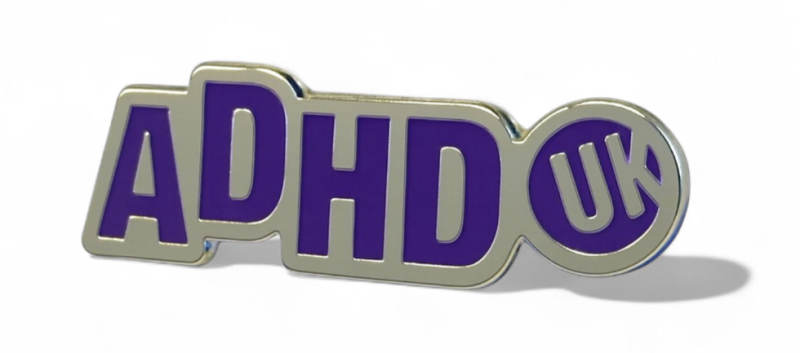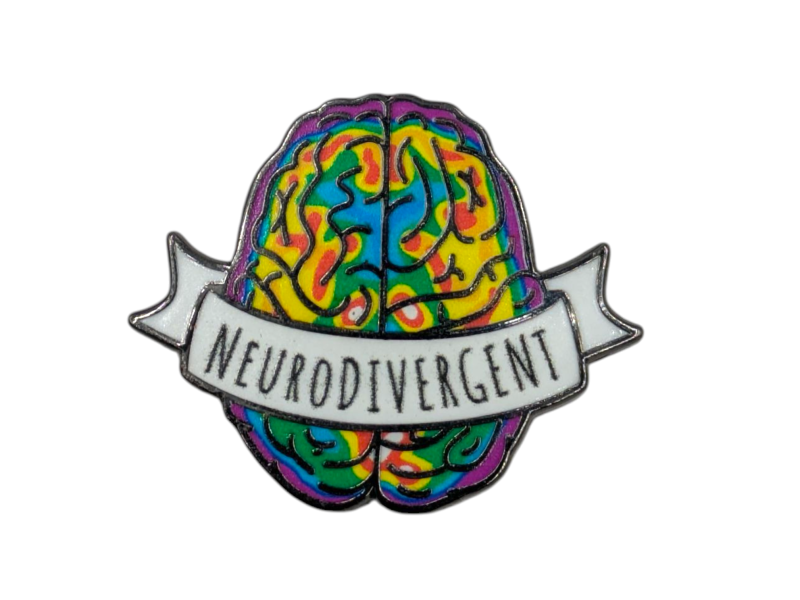
What is ADHD? And Why Awareness Pin Badges Matter
To help you learn more about ADHD, here's a quick peek inside the mind of the Made by Cooper content writer
My Brain - It's October next month, ADHD awareness month, you've got ADHD, write something.
Impulsive Brain - Yeah, write about your ADHD experience, take some photos of ADHD pins, send the blog to every ADHD organisation, make an Instagram advert, the company will make a fortune, you'll get a big fat raise. I'm getting a new tattoo to celebrate! Later!
Rejection Sensitivity Brain - But I only got diagnosed 6 months ago. What do I really know about ADHD? It'll be crap. No one's gunna read it. I'll embarrass myself, embarrass the company, and get fired.
My Brain - But you've had ADHD your whole life. Help people understand what it's like living with neurodivergencies. Remember when people said no one would read your blog about David Tennant wearing the Doctor Who trans-rights pin, but it went viral?
Inattentive Brain - Ha ha! Yeah, I remember that! That badge is awesome. I love Doctor Who. I wonder how many views that page has now? Damn it, what's the Google Search Console password?
Auditary Processing Brain - What the hell is a Bugle Church Washbowl?
Inattentive Brain - What? I said Goog...
Auditary Processing Brain - Never mind, I just got it. The password is "ADHD1234"
Inattentive Brain - What password?
Autistic Brain - I hate you all. Also, it's already October.

What Is ADHD?
While I wrote the intro to this blog in a comedic way to grab your attention, those facets of my experience with ADHD are very real. And while the stereotypical view of ADHD might seem quirky and fun, they can lead to some very dark places.
Struggling with focus and attention is a one-way ticket to getting into trouble at school and work. Impulsivity can significantly affect relationships, finances, and, in some cases, personal safety. Rejection sensitivity disphoria (where people feel everyone hates them, they're constantly feeling criticised, and even constructive criticism feels like a punch to the gut) is a perpetual drain on mental and emotional resources. While auditory processing disorder (where the brain takes longer to process information) can be highly frustrating for people with ADHD and those around them.
These are but a few of the struggles that someone with ADHD deals with for every minute of every day, which can often lead to other mental health issues.
What the ADHD community needs is more understanding, support, and research into the condition. Fortunately, more and more groups and charities are appearing to help with this often misunderstood disability.

ADHD UK - Who They Are, What They Do, & Why They Love Pin Badges?
One of the incredible organisations we’re proud to work with is ADHD UK, a charity dedicated to providing resources, support, coaching, and advocacy for people with ADHD. They’re a driving force for awareness and understanding within the neurodivergent community, using custom merch to help people feel seen and supported.
So, I spoke with their founder and CEO, Henry Shelford, to find out more about ADHD, what the charity does, and how it uses pin badges to spread awareness and solidarity.
In true ADHD fashion, there was a mix-up about where the meeting was being held, a couple of technical issues, multiple off-topic tangents, and we ran over by about 45 minutes.
However, what Henry had to say was very important to help us move towards a better understanding of ADHD.
Made by Cooper: What is something about the ADHD experience that is the least understood?
Henry Shelford: ADHD is far harder to live with than most people realise.
One statistic that underlines this difficulty is that the average life expectancy of a woman with ADHD is 9 years lower than that of a neurotypical woman, while a man's average life expectancy is 7 years lower than that of neurotypical men, which I think really speaks to how challenging it can be.
Is it okay to talk about suicide statistics?
MbC: Of course.
HS: One in four girls and one in ten boys with ADHD will, at some point, try to take their own lives. For the first two years of ADHD UK, we were almost exclusively funded by parents whose children had completed suicide.
I think these statistics are important to outline, because even though we know that people with ADHD can be happy and prosperous, and not everyone with the condition has suicidal ideation, all too often, people with ADHD find themselves in that dark place.
MbC: Can you tell me a bit more about ADHD UK and how it came to be?
HS: I have ADHD, and I found it very frustrating that so few people knew what ADHD was. Having to explain the condition over and over was exhausting, and there were so few resources to help people with ADHD better understand themselves and help them thrive. So, about 5 years ago, I founded ADHD UK.
The charity is built on five core pillars: Support, information, awareness, advocacy, and research.
MbC: What are some of the biggest misconceptions surrounding ADHD that you still hear today?
HS: Many people still think ADHD is naughty little boys who just need better parental discipline.
But ADHD affects girls, boys, women, and men alike.
Many also think that people with ADHD are just hyperactive and need to go for a run. In reality, it affects people of all genders and races who face challenges with focus, impulsivity, and emotional regulation.
We hear lines like "Everyone's a bit ADHD", but that's like saying you understand clinical depression because you were a bit sad one time, or you know what chronic anxiety is like because you got stressed out of an exam, or you've experienced OCD because you like your kitchen to be neat and tidy.
These things are simply not the same.
MbC: What are some of the biggest challenges that ADHD UK faces in spreading awareness and accessing funding?
HS: Money is incredibly tight. ADHD UK is the number one ADHD charity in the country, and we receive one six-hundredth of the funding of the number one autism charity, which we don't begrudge them, it just shows you the different sorts of values put on each condition.
ADHD is a highly stigmatised condition. Lots of people won't even tell their family and friends that they have ADHD, let alone their work colleagues.
Raising money is really hard, but we do exceptional things with the money we get. But still, there's so much that we want to do, but we just can't. We only have two people working for ADHD UK, but we have an enormous number of incredible volunteers.
MbC: How do you use the ADHD UK pin badges that you make with us?
HS: So the ADHD UK pins, we sell half of them in our shop to raise money for the charity, and the other half are given to people who run fundraising and awareness events as promotional materials.
The new ADHD UK Ambassador badges are going to the wonderful volunteers who help us with fundraising and the press and things, so we wanted to do something to celebrate them.
I just want to outline that these badges are more important than people realise. ADHD is a really stigmatised condition. I've had some really bad experiences talking about it myself. And seeing someone wearing an ADHD pin badge is telling them it's okay to have ADHD, and that's a big deal.
It genuinely, really, matters. When you see someone wearing the badge, you know they're someone with a shared experience, that they're a safe space, and you can truly be yourself.
And that's a wonderful thing.
MbC: Why is ADHD Awareness Month so important?
HS: In reality, every month is ADHD Awareness Month for us, it's literally what we do. But as a charity, it gives us more opportunities for exposure as more people start paying attention.
This year, we hosted the world's largest ADHD conference, which ran for 28 straight hours (watch it here), featuring talks in the UK, Australia, New Zealand, Hong Kong, and Singapore. We had some amazing headliners like Ben Branson, Sam Thompson, Tim Kendall, the former head of NHS England.
And we've hosted virtual support groups, multi-language support groups. Groups discussing being a black woman with ADHD, which are run by a black woman, so that people can feel seen and heard. We also have groups where you can learn about finances or learning how to play a musical instrument if you have ADHD.
How You Can Help ADHD UK
If you’d like to support the incredible work ADHD UK is doing, there are a few simple ways to help. You can donate directly to fund their vital support services and research, fundraise or volunteer your time to help raise awareness, or buy an ADHD pin badge.
This small symbol makes a massive difference in helping people feel seen and understood. However you choose to get involved, every action helps create a world with more understanding, empathy, and support for the ADHD community.

Ready to Create Your Own Awareness Merch?
If you managed to get to the end of this blog (well done, especially if you have ADHD) and you feel inspired to design your own awareness merch, whether it’s for ADHD or another cause close to your heart, we’d love to help.
At Made by Cooper, our free design service makes it easy to turn your ideas into custom pins, patches, or keyrings that start conversations and make a difference.
Get in touch today and let’s create something that helps your community feel seen, supported, and proud to show what they stand for.